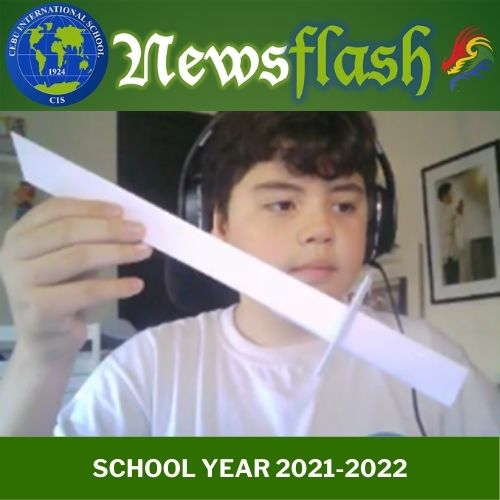
Admin News
by Dr. Gwyn Underwood, Superintendent
As we complete the second week of our Adverse Circumstances Learning (ACL) program (developed to cater to the lack of internet and power availability of many CIS families following Typhoon Odette), it is great to see students and parents adapting to the program, and progressing as best they can under the various individual conditions they are facing. I am so proud to be part of a community that is actively demonstrating grit (or resilience) by just getting on doing what we can do, as best we can!
Our teachers report a good level of participation by those who are able to join our daily HR classes, and students are generally responding well to the ACL self-paced learning packets that are downloadable if needed to enable them to complete their schoolwork even if they are in locations without internet or power.
- As more students in classes get their internet restored, they are encouraged to join the additional online options available to them (teachers are available 9am-12nn for online support, and some may even begin to offer specific sessions next week for their class if there are enough students online).
- Early next week, the Academic Management Team (AMT) will meet to determine if we are ready to transition back to our regular Remote Learning (RL) program following week 3 of ACL. As of today, there are still a considerable number of families who still do not have internet, or are using expensive and/or unstable options such as pocket wifi or mobile data plans. Unless this changes drastically, then, it is most likely that we will have a transition week in week 4, where we will expand online options, but not move back to a full RL program. Hopefully, the move back to RL will be possible after our Chinese New Year long weekend holiday (Jan 31-Feb 1), but we will have to see how conditions develop before we confirm that.
The Omicron variant of Covid-19 has arrived in Cebu in force, and we are getting reports of a number of our community testing positive.
- Thankfully, the vast majority have mild or no symptoms (asymptomatic), but to be sure you and your family are safe, please take precautions, especially as the Omicron is reported to be more contagious than previous variants.
- As Cebu has moved to Covid Alert Level 3, we have had to adapt to new conditions that are again more restrictive than we would like. Do not be discouraged, however, as based on patterns in other countries, this wave will diminish in time. We will continue with our recovery plans in the meantime, and look forward to returning to Level 2 and our eventual return to campus!
We will keep you updated as the situation progresses. Have a wonderful, restful, safe weekend!

Grade 2 Writers
by Ms. Maureen Juanson and Ms. Maffy Ocleasa, Grade 2 Teachers
We had a yummy conversation with our Grade 2 writers as we talked about the kind of hamburgers we like to eat. One thing we noticed is that many of us like to have cheese, mayonnaise, ketchup, and of course the patty! Some even said that they like to add vegetables to their hamburger too, just like lettuce, onion, and tomatoes. This led us to wonder how does learning about hamburgers helps us become better writers?
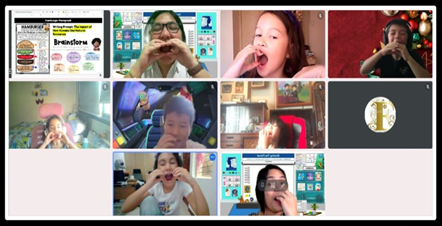
We learned that just like a hamburger, our informational paragraphs also need certain things for them to be complete. It needs to have juicy ingredients in the middle and a bottom bun to make it complete. The top bun represents the topic sentence that talks about the main idea. The tomatoes, lettuce, and patty represent the supporting details like facts, evidence, examples, and cause and effect relationships about the topic. Finally, the bottom bun represents the closing sentence that restates the main idea but in a different way. The hamburger can help us structure and organize our informational paragraphs.
In order to support our unit of inquiry, Sharing the Planet, the Grade 2 writers applied their understanding of informational paragraphs to write about the impact of how humans use natural resources. Below you will find some examples of their writing. Enjoy reading!
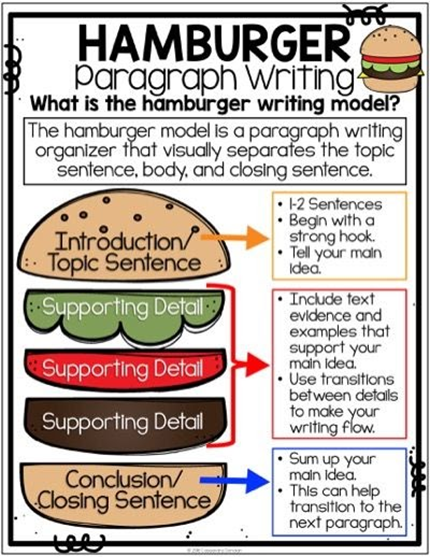
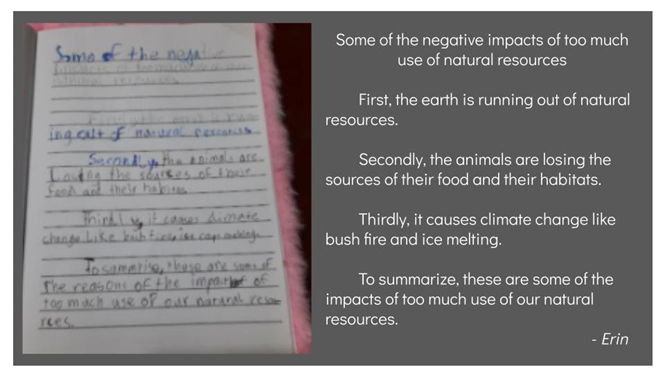
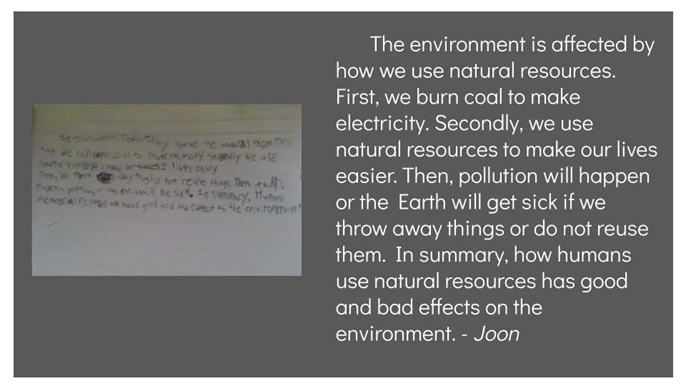
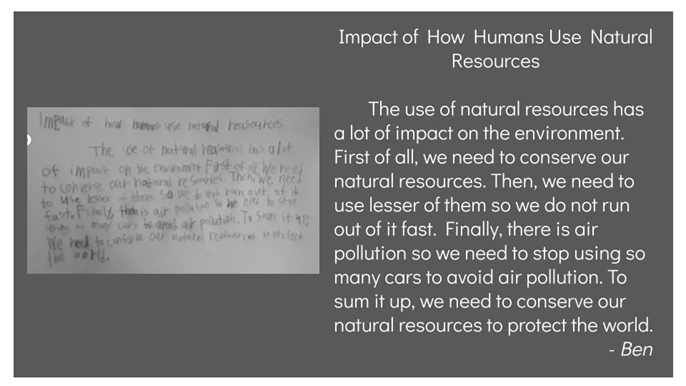
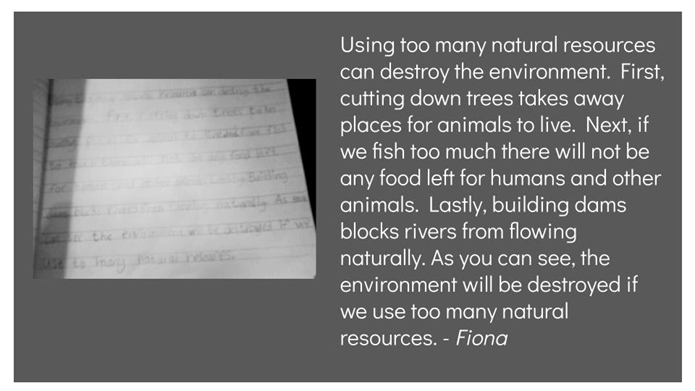
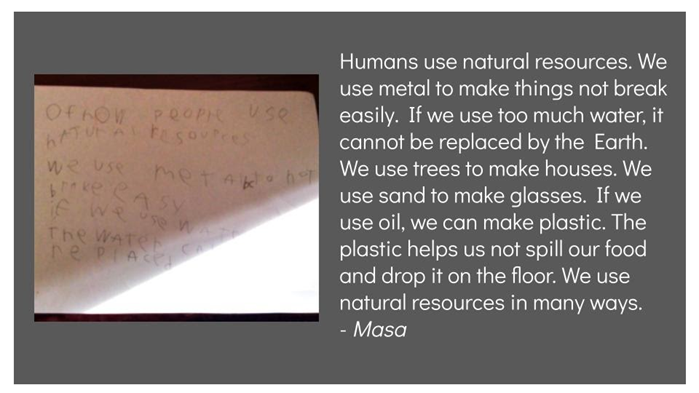
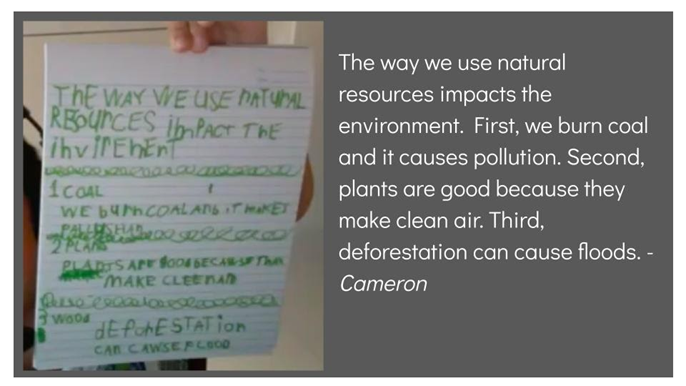
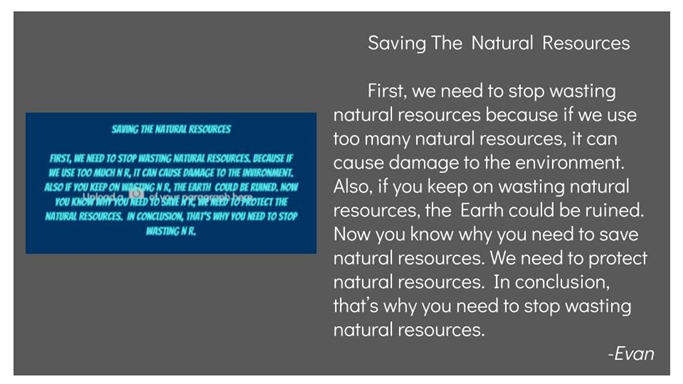
Grade 10 Psychology
by Ms. Vangie Villagonzalo, Psychology Teacher
Psychology 10 is a trimester-long course designed to give students a basic overview and understanding of the subject. The students learned that psychology aims to be empirical and there are many approaches to understanding behavior; thus, students worked on guides to organize and review different approaches and research methods. The global context for Mudule 1 centers on identities and relationships. Students will explore identities, different beliefs, values and approaches. Part of their learning engagement task is to research on the different approaches and analyze how these approaches reflect and explain human behavior and mental processes.
Here are some of the students sample slides and reflections:
I found it very interesting that each approach normally lined up with either nature or nurture, or sometimes both. It was interesting to learn that psychology has many facets, and is not just about mental health and what we normally think of. I believe that I could use what we learned when I’m trying to understand other people; people have different opinions, different ways of thinking and their own reactions to different circumstances. – Mahati
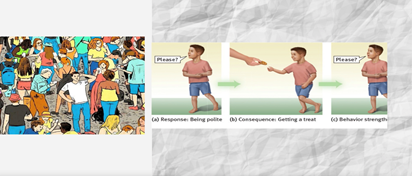
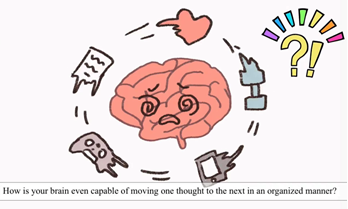
This module really helped me understand the different psychological approaches. I was able to learn a lot about all these approaches from watching my classmate’s outputs and also learned about my assigned topic. I had the chance to do extensive research on the cognitive approach and create a video that summarized all the important information. I did not know that there were that many psychological ways to understand one’s behavior so learning about all these approaches was very interesting to me. – Marianne
Learning different psychological approaches was a new experience. It was a really nice revelation that there are a lot of different perspectives when trying to explain, describe, or predict behavior which I haven’t thought about, I always thought that there was just 1 way or 1 approach in psychology. This is a slide I want to include that captures the essence of my learnings as this is the beginning or mark of the approach in my presentation. It captures the essence of my learnings as this perfectly explains how evolutionary psychology works and how our behavior was passed down from generations. – Max
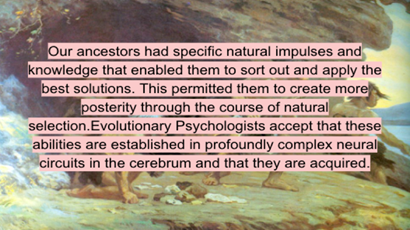
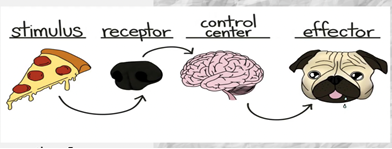
So far in this unit, I have learned about behaviorism. Behaviorism is the theory that human and animal behavior can be explained in terms of conditioning. Two of its basic assumptions are that all behavior is learned from the environment and behavior is caused by stimulus-response. – Sofia
I personally focused on the cognitive approach, which talked more about the mind, and how the brain functions in our day to day lives. One example to explain how cognitive psychology helps us, is in our daily lives. When we wake up, we immediately start applying cognitive psychology. We process activities that we will do during the day, and try to organize what we will do first, next, last, etc. I really like the topic of this unit as it caught my attention and gave me a brief grasp on how psychology really works and branches out. I think in this project, I was able to develop my research skills thoroughly, and also learn how to format information in a more eye-catching and organized manner. I was also able to encourage myself to think more about how my brain actually works, and I don’t want to take away my ability to process information for granted. – Seohyun
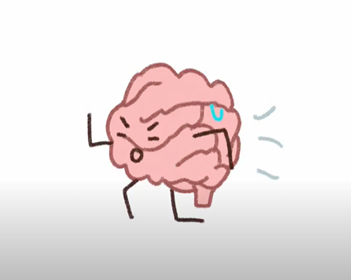
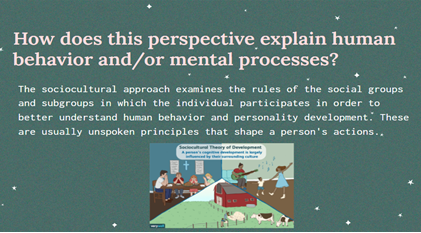
I learned that the sociocultural perspective revolves around the idea that the social and cultural norms of our society affect our individual development. This perspective or theory takes into consideration the interactions between young individuals and the culture they are surrounded by. I can apply my learnings from this module in my daily life by becoming more self-aware of how sociocultural influences play a big role in the person I am and will become in the future. – Bella
Aside from knowing that psychology is a study of human behavior, I was clueless, most especially in its approaches. When we began this module, it was a lot of new information that made me really think, reflect, and ultimately realize that the way I and those around me behave can actually be psychologically reasoned out and explained. When we were assigned this summative assignment of researching different psychological approaches, I was actually excited because I knew that I could get so much new knowledge. The project definitely came with many challenges, but in the end I can say that the Sociocultural and Cross-cultural approach to me are intriguing topics in the sense that anyone and everyone, anywhere can observe how it is applied in the real-life context. My key takeaway from this topic is that, when put briefly, the Sociocultural and Cross-cultural approaches mainly look into the development of one’s behavior based on various cultural and social factors in the context of the individual’s environment and background, to better understand their behavior. – Victoria
The most interesting part I would say is the cognitive approach. There is nothing more fascinating than a brain. It has been said to be one of the most complicated things on earth that the human kind has yet to understand. We may have a heart pumping but no brain activity, we CANNOT live without a brain! Nowadays we have mechanical hearts but we haven’t even come close to creating a human brain. And how everything is like an equation, everything connects to everything, impacts everything, affects everything. And the fact that we know so little leaves so much space for imagination. And that is why I find the cognitive approach so much more interesting. – Chiara
I think for me, growing up and always moving to so many places and traveling so much, it really was interesting to see that the social and cultural world affects my behavior or how I am now. I enjoyed it because it affects me as a person and learning about it helped me understand reasons why we do certain things without even realizing. – Sealoa
College/Careers Counselor Corner
by Ms. Jenny Basa, College/Careers Counselor
Question of the Week
How much does going to college cost?
There are 5 main categories of college cost:
- Tuition and Fees: This is how much the university or college will charge you to pay for classes and other services like the library and common areas for student use.
- Room and board: This covers accommodation and meals. Some universities provide a meal plan for students that come with a dormitory fee. Depending on whether you live on campus or out of campus, the cost will vary.
- Books and supplies: As a college student, you will need to buy or rent textbooks and course materials. These usually vary depending on the program you are taking. For instance, a fine arts program usually requires purchase of art materials which will cost more than a regular student who takes classes without a laboratory or studio class.
- Personal expenses: This includes your cell phone, internet bill, laundry, eating out and other expenses one may incur. This is relative according to what a student wants to do on weekends and breaks.
- Transportation: A student may commute to campus or stay on campus. This should definitely be factored into the budget. This includes your transport fare if you are flying to another country to study or staying within your country and city.
The above categories are basic expenses you have to plan for. The list is not exhaustive and you can always add to it if you wish to. Next week’s feature will show an estimate of costs of universities locally and abroad.
Upcoming Virtual Events and Fairs: (students & parents are welcome)
DATE
January 26
8:00AM (EST)
Link to register
EVENT
Study in the Metro New York City Area – Info Session with a Student Panel featuring: Fordham University, Fairfield University, Hofstra University, Montclair State University, New Jersey Institute of Technology, Pace University and St. John’s University
January 26
10:00PM (PHT)
Link to join
(This is a Facebook Live event)
Tallinn University of Technology (Estonia)
- Join a Q & A session with TUT student ambassadors.
TUT offers 4 undergraduate programs in English: Cybersecurity Engineering, International Business Administration, Law and Integrated Engineering
January 29
12:00PM (EST)
Link to register
Johns Hopkins University – “Explore Engineering Innovation” : a Pre-College Summer Program Information Session

January 30
2:00PM (JST)
Link to register
(if you are unable to attend, you can get a recording if you register)
How to Apply to Ritsumeikan University

January 31
10:00AM (JST)
Link to register
(if you are unable to attend, you can get a recording if you register)
Temple University Japan: Admissions 101 – How to apply to TUJ’s Undergraduate Program :Applications, Scholarships, Financial Aid, Q&A and more.

SAT Update
| 2021-2022 TEST DATES* | Registration Deadline |
| March 12, 2022 | February 11, 2022 |
| May 7, 2022 | May 5, 2022 |
| *The Optional SAT Essay and Subject Tests have been discontinued. | |
To register for the SAT, you may click on this link. If you need assistance or have any questions, please feel free to email Ms. Jenny Basa at jbasa@cis.edu.ph.



